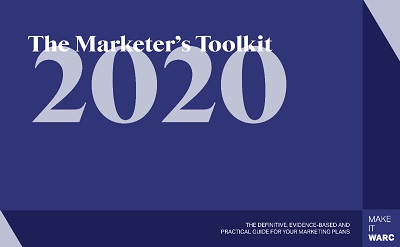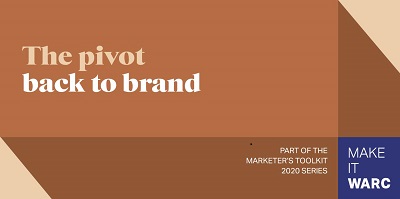
LONDON, Jan 13, 2020 - (ACN Newswire) - Marketers are re-assessing their spending plans for 2020 with a renewed focus on brand-building with long-term impact over performance marketing with short-term payoffs.


A pivot back to brand is the main theme highlighted in the Economy chapter of WARC's Marketer's Toolkit 2020, an annual report that assesses the influences on marketing strategies for the year ahead.
A survey of marketing executives conducted as part of the Marketer's Toolkit 2020 found that short-termism is the number one industry issue with 70% of respondents agreeing that brands have over-invested in performance marketing. Importantly, 40% predict increased brand investments in 2020 versus 32% who see higher performance budgets.
David Tiltman, VP Content, WARC, comments: "Brand building is back and is set to be a major trend for 2020. After years of focus on digitally-enabled performance work, a growing number of brands are reviewing their approach to long-term brand-building amid claims the industry has become too focused on the short-term.
"Whilst we've found plenty of evidence that this will be the year when marketers re-invest in their brands, we've also found that there are significant hurdles, including internal culture, marketing skillsets and the need for better brand metrics."
The Economy chapter of WARC's Marketer's Toolkit 2020 draws out the following issues:
- Marketers are reprioritising 'long-term' brand-building amid a crisis of short-termism
The efforts of researchers such as Les Binet and Peter Field to refocus brands on the long term are bearing fruit. Binet & Field famously argued that a 60/40 investment split between brand and sales activation was the 'rule of thumb'. Many CMOs acknowledge they are way off those numbers and increasingly recognise that they have over-invested in short-term marketing tactics (or 'performance' marketing) at the expense of their brands.
At the same time, fresh research is underlining the crisis short-termism is creating. Field debuted new research (with the Institute of Practitioners in Advertising) during a WARC session at Cannes Lions last year arguing that short-termism had undermined the link between creativity and effectiveness.
Orlando Wood, Chief Innovation Officer, System1 Group, advises: "There are five practical ways that advertisers can make their work more effective: Entertain for commercial gain. Think dramas, not lecture. Play with culture, don't mirror it. People are characters, not 'props', and local richness beats global blandness."
- Digital-first brands are pivoting to brand-building to scale their businesses
Much has been said about the need for established companies to learn from the new wave of 'digital-first' or 'direct-to-consumer' businesses disrupting their categories.
But digital-first brands, as they grow beyond their early adopter audience, are now discovering the same rules of sustainable long-term growth apply to them as to traditional business models.
In the US, the Video Advertising Bureau noted a 60% increase in TV spend by direct-to-consumer brands. In the UK, e-commerce marketplace eBay - which had dedicated 90% of its budget to performance marketing for more than decade - upped brand investment from 10% to 35% over four years and saw a "dramatic" improvement in brand consideration and the growth of organic traffic.
- There is a tension between what brands are saying and where they will spend
Although respondents are concerned about the impact of short-term strategies on their brands, the survey reveals the gap between intention and action. Money continues to pour into marketing channels best suited to performance marketing or short-term impact. There is a positive outlook for search and online display in the survey, while 'classic' brand-building channels like TV and out of home look more negative.
Brands appear to view online video as key for brand-building in 2020, with more than 80% anticipating greater spend on that channel.
Gill Zhou, VP of Marketing, Communications and Citizenship, IBM China, comments: "Many times the marketing department is seen as a cost centre, so CMOs save money to increase output, but it is not enough."
- Culture, skills and metrics are key barriers to brand-building
Survey respondents identified the general business culture of short-termism, and a squeeze on budgets as significant challenges to brand-building.
Another issue is a loss of confidence among modern marketers as to their ability to build brands. An IPA/ Financial Times study released mid-2019 found that almost one in three senior marketers rated their ability to build brands as average to poor.
Respondents also point to metrics - specifically, the need for better signals that brand-focused work is having an impact and can be presented in a business language other members of the C-suite can understand. 50% of respondents said customer experience (CX) will remain a focus for brands in 2020 but 71% say this is harder to measure than advertising.
Simon Cook, Managing Director, Cannes Lions, says: "Being creative while retaining consistency of brand is key to unlocking the benefits of brand-building: from forging emotional attachments, to driving long-term brand equity and sales influences."
Test-and-learn may be key for companies looking to reinvest in brand. Marketers should take note of an experiment by Australian insurance giant IAG. To test the case for long-term brand investment, it will spend 80% of its budget on brand-building activities in a targeted part of Australia for the next two years.
WARC's Marketer's Toolkit 2020, the definitive, evidenced-based and practical guide for marketers to plan for 2020, is based on a survey of almost 800 client and agency-side practitioners around the world, combined with insight from a series of interviews with Chief Marketing Officers, backed by evidence from WARC Data, case studies and expert opinion.
The report, available to download from http://content.warc.com/marketers-toolkit-2020-download.html, covers five key drivers of change: society, tech, economy, industry and policy. A deep-dive into each of the five chapters including more on Economy, for which WARC has collaborated with sister Ascential brand Cannes Lions, is available to WARC subscribers.
WARC also conducted an interview with Les Binet, Group Head of Effectiveness at adamandeveDDB and a leading researcher on marketing effectiveness, about the practicalities of long-term brand building, how to convince the CFO, and smart ways to measure marketing impact in 2020, available to read on www.warc.com/newsandopinion/opinion/Les_Binet_on_why_longterm_marketing_matters_in_the_age_of_shorttermism/3307?p=1
About WARC
- advertising evidence, insights and best practice
WARC provides the latest evidence, expertise and guidance to make marketers more effective. WARC's mission is to save the world from ineffective marketing.
WARC's clients include the world's largest brands, advertising and media agencies, media owners, research companies and universities. They rely on WARC for rigorous, unbiased information and advice on almost any advertising and marketing issue, which WARC delivers via best practice guides, case studies, research papers, special reports and advertising trend data, as well as via webinars, awards, events and advisory services.
WARC collaborates with more than 50 respected industry organisations globally including: The Advertising Research Foundation, Cannes Lions, Effie Worldwide, Association of National Advertisers, ESOMAR, 4A's, IPA and DMA.
WARC was founded in 1985, and has offices in the UK, US and Singapore. In July 2018, WARC became part of Ascential plc, the global specialist information company.
Contact:
Amanda Benfell Head of PR & Press +44 20 7467 8125 amanda.benfell@warc.com
Copyright 2020 ACN Newswire. All rights reserved. www.acnnewswire.com
